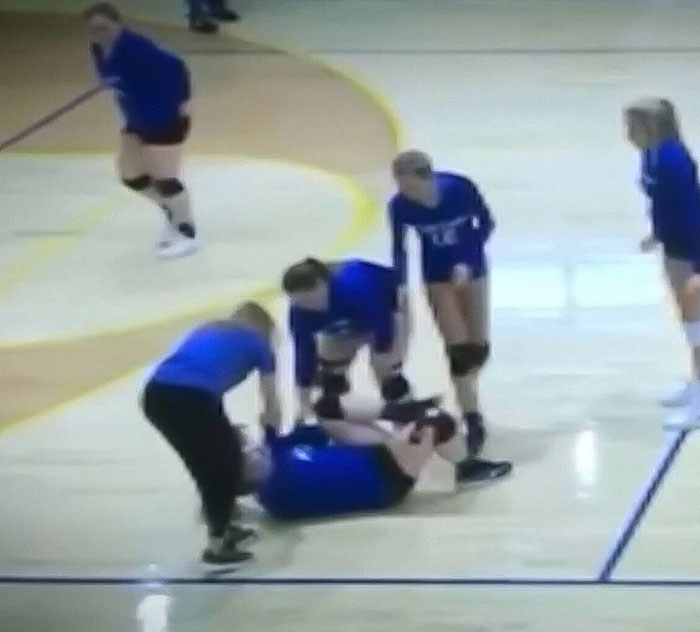After Trans Player Violently Injures Teen, She Breaks Silence On Her Shattered Volleyball Dreams
A 17-year-old’s dream of becoming a college athlete was shattered in a second after she was hit in the head by a high-speed volleyball spiked by a transgender player.
The impact rattled her brain, causing an instant knockout made even worse as she hit the floor. Payton McNabb, from Murphy, North Carolina, was unconscious for 30 seconds and woke up to her future as a player in pieces.
Two years later, McNabb is sharing her story in the documentary Kill Shot: How Payton McNabb Turned Tragedy Into Triumph in hopes of preventing similar incidents from happening to others.
“It was 100% avoidable,” she lamented before delivering a poignant remark: “If only my rights as a female athlete had been more important than a man’s feelings.”
A former high school volleyball player who got a brain hemorrhage after playing against a transgender athlete released a documentary about her ordeal

Image credits: payton.mcnabbb
McNabb, now 19 years old, has endured a long and arduous journey after suffering from a concussion, neck trauma, and two black eyes after the ball hit her head.
The full extent of her injuries only became apparent two weeks after the incident, when doctors diagnosed her with a traumatic brain injury, a brain bleed, partial paralysis, and loss of peripheral vision in her right eye.
As her body recovered, McNabb also experienced memory loss, confusion, and recurrent, debilitating headaches.

Image credits: Independent Women’s Forum
The game that changed her life took place at Hiwassee Dam High School in Murphy, North Carolina in 2022. McNabb and her teammates were aware of the presence of the transgender athlete on the opposing team but hesitated to voice their concerns due to the political and social implications of it.
“We never thought we would ever be put in this position to begin with,” McNabb recounted with impotence. “I didn’t know one person who agreed with [a transgender athlete competing against us] on my team, but we didn’t know what to do.”
The family affirms they weren’t allowed to voice their concerns at the time but hope that their testimony serves as a turning point

Image credits: Independent Women’s Forum
As McNabb hit the floor and was subsequently escorted off the court in a stretcher, the gym fell into silence, as if in acknowledgement of what had transpired. However, they collectively brushed aside the impact and the match continued, trans athlete included.
Pamela McNabb, the girl’s mother, explained the mix of anguish and guilt their family has experienced in the aftermath of the incident.

Image credits: Independent Women’s Forum
“The guilt Payton’s father and I carry is heavy,” she shared, feeling they should’ve been more vocal about their concerns. “At the time, we weren’t allowed to speak up. We couldn’t say, ‘No, she’s not playing against a boy, it’s dangerous.'”

Image credits: Independent Women’s Forum
For the mother, even if she has to live with feelings of remorse for the rest of her life, she expressed a desire to warn others and hopefully turn what happened to her daughter into a turning point for the conversation of trans players competing against cis-gendered women.
“I would never, ever let her play today if I knew what I know now,” Pamela added. “Pull your kid. Don’t play. It is not worth what has happened to her to happen to anybody else’s child.”
McNabb’s case was instrumental in the passing of a bill that bans trans athletes from competing in women’s sports in North Carolina

Image credits: Independent Women’s Forum
Throughout the ordeal, the identity of the transgender athlete has been protected for security reasons. However, according to McNabb, the player has “never expressed remorse” and even mocked her at one point.
In the documentary, McNabb displays an Instagram message from the player which reads, “Wow I really am living rent free in your head, aren’t I?”

Image credits: Independent Women’s Forum
Due to the delicate nature of the subject matter, McNabb made the difficult decision in April 2013 to testify at the North Carolina General Assembly in favor of the Fairness in Women’s Sports Bill.
“I was hesitant about it,” she admitted. “It’s not my comfort zone at all, and I didn’t want this attention.”
Despite the pressure she felt, the idea of something similar happening to her younger sister, or a possible future daughter, steeled her resolved. “I seriously just cannot accept that at all,” she said.
The idea of banning trans players has sparked heated debate, with Olympic athletes dismissing the idea of it protecting women’s sports

Image credits: Independent Women’s Forum
McNabb’s efforts were not in vain, as shortly after her testimony, North Carolina passed a ban on transgender athletes competing on middle, high school, and college-level women’s sports teams.
Sylvia Hatchell, a former head coach of the state’s women’s basketball team and key supporter of the bill, explained the motivations behind the legislation:
“I support transgender athletes and their right to gender identity as they see fit,” Hatchell said at a press conference. “However, competitive sports is one of the few places in our society where sex differences matter.”

Image credits: Independent Women’s Forum
The banning of transgender athletes from women’s sports has been a source of constant, heated debate in recent months.
In April of this year, a group of more than 400 current and former Olympic and collegiate athletes, as well as 300 academics and advocacy groups signed a letter urging the National College Athletics Association (NCAA) to not issue a similar ban.

Image credits: Independent Women’s Forum
In the letter, athletes call on people to be on “the right side of history,“ believing that the prohibition would be against the principle of sports being “truly for us all.”
Megan Rapinoe, a notorious two-time Olympic medalist, also distanced herself from the idea that such bans protect women’s sports, stating that they “do not speak for us and do nothing to protect us.”
Netizens were divided over McNabb’s story, with one side sympathizing with her and supporting her movement and the other questioning the legitimacy of her testimony
“The mere fact that men compete against women is absurd,” one reader argued. “Trans people should have their own league, and regular, normal people can have their traditional men’s and women’s sports.”
“This is criminal! People responsible for this should be arrested and be made to stand trial!” another wrote.
“I don’t know if she is just anti-trans or so dumb that she thinks that one incident couldn’t have happened with a cis athlete,” a detractor stated.
“The girl got a concussion from getting hit in the head. Was the trans girl’s spike way more powerful than normal spikes? People break bones and get concussions literally all the time.” another argued.
“Sue the school,” wrote one viewer, while others joined in to share their indignation at what happened to McNabb












No comments